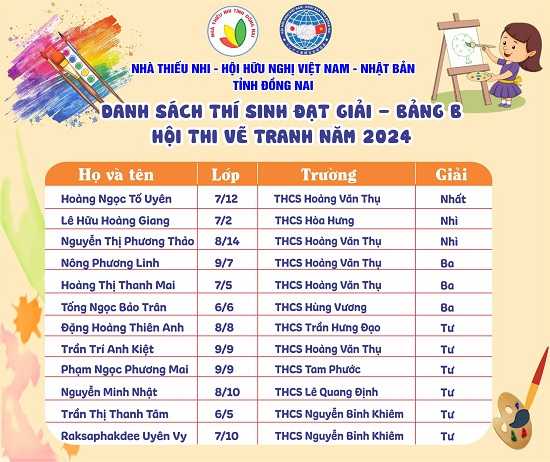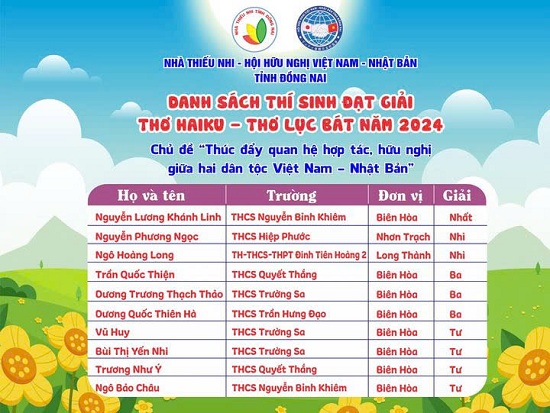From November 3 to November 15, 2024, the Vietnam - Japan
Friendship Association of the province coordinated with Dong Nai Children's
House to organize “the 2024 Vietnam - Japan Painting Contest”, “the 2024 Haiku
and Luc Bat Poetry Writing Contest”, with the theme "Vietnam and Japan promotes
the sustainable, long - term friendly and cooperative relations” with the
participation of about 250 candidates who are students in the province.
After the competition, the Jury found 24 excellent works
that won the 2024 Painting Contest and the 10 best works of the Haiku and Luc
Bat Poetry Writing Contest. The awards will be presented by the Organizing
Committee at the Vietnam - Japan Friendship Cultural Exchange Program on
November 30, 2024, specifically:

 For “the 2024 Vietnam - Japan Painting Contest”, there
are 02 1st prizes, 04 2nd prizes, 06 3rd
prizes,12 4th prizes.
For “the 2024 Vietnam - Japan Painting Contest”, there
are 02 1st prizes, 04 2nd prizes, 06 3rd
prizes,12 4th prizes.

For “the 2024 Haiku and Luc Bat Poetry Writing Contest”, there
are 01 1st prizes, 02 2nd prizes, 03 3rd
prizes, 04 4th prizes.
*Haiku is a type of short form poetry that
originated in Japan,
and can be traced back from the influence of traditional Chinese
poetry. Traditional Japanese haiku consist of three phrases composed
of 17 morae (called on in Japanese) in a 5, 7, 5
pattern; that include a kireji,
or "cutting word"; and a kigo, or seasonal
reference. However, haiku by classical Japanese poets, such as Matsuo Bashō,
also deviate from the 17 - on pattern and sometimes do not contain
a kireji. Similar poems that do not adhere to these rules are
generally classified as senryū.
*Lục bát is a
traditional Vietnamese verse form - historically first
recorded in Chữ Nôm script. "Lục bát" is Sino - Vietnamese for "six - eight",
referring to the alternating lines of six and eight syllables.
It will always begin with a six - syllable line and end with an eight-syllable
one. Lục bát is traditionally composed and enjoyed by people of all classes,
from the lowly peasants to the noble princes. It can be regarded as a living
style of Vietnamese people. The rich
treasure of Vietnamese folk poems (ca dao), which consists of hundred thousands
of verses that reflect on life, morality, human relationships, and natural
beauty, is almost entirely composed in lục bát form.